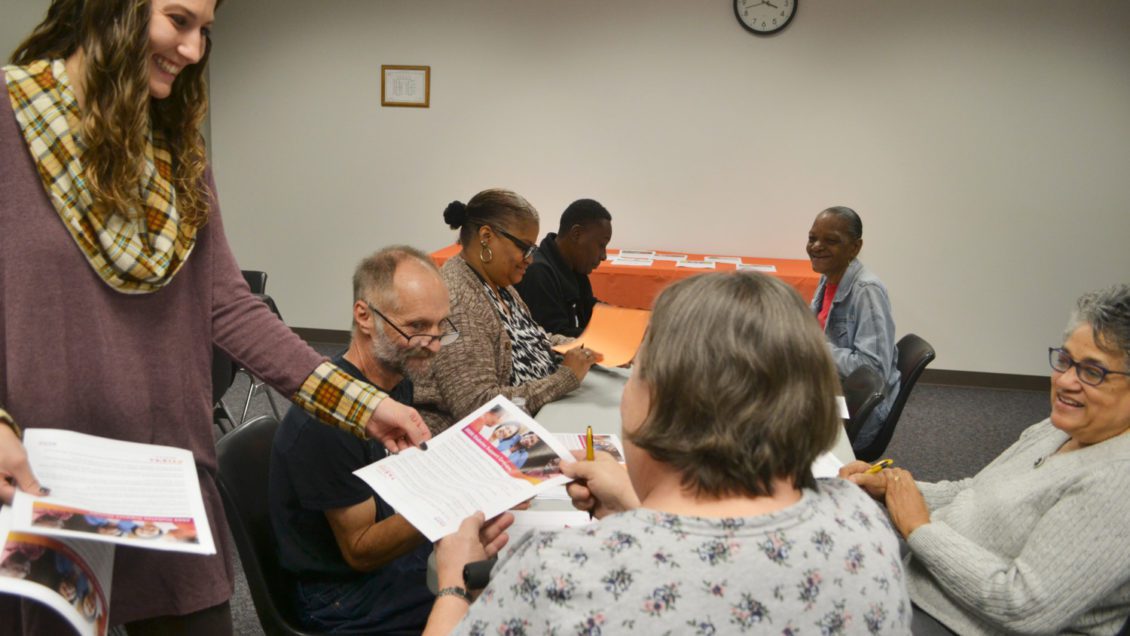
GREENVILLE – A diabetes education and support program created by Clemson University and Prisma Health-Upstate is one of the first in the nation to be recognized as a practice-tested diabetes self-management support program by the American Diabetes Association (ADA).
The program, Health Extension for Diabetes, is listed on the Diabetes Support Directory, a free online tool to help connect communities to a qualified, American Diabetes Association-approved diabetes support program. The association’s Diabetes Support Initiative, which includes the directory, assures that diabetes program curricula, such as Clemson’s, meet its criteria for support programming, and align with the Standards of Medical Care in Diabetes and demonstrate significant positive health outcomes. The programs in the directory must also have evidence demonstrating the program’s impact, which includes the participant’s development of coping skills and behaviors to self-manage diabetes on an ongoing basis.
Health Extension for Diabetes was started two years ago with Healthy Greenville program funding from the Greenville Health Authority board of trustees. Co-led by Clemson’s public health sciences department, Clemson Cooperative Extension and Prisma Health-Upstate, the initiative has a goal to reduce the incidence and complications of diabetes and improve the health status of Greenville County.
Michelle Stancil, manager of Diabetes Management at Prisma Health-Upstate, and Michelle Parisi, Clemson Extension’s director of Nutrition and Health Extension Programs, said the Health Extension for Diabetes program has been a success since its start.
“Clemson’s partnership with Prisma Health-Upstate models the ability for Extension agents to create bridges between the community and the health system,” Parisi said. “This results in a strategic and coordinated link between clinicians and the community, thus filling a gap in traditional health care. ADA’s recognition of our program will not only promote the program itself but will also demonstrate an evidence-based model for partnering across systems to increase the health of our communities.”
Diabetes impacts quality and length of life. Unmanaged, this condition can lead to many complications that include blindness, kidney failure, heart attacks, strokes and amputations, according to the Centers for Disease Control and Prevention.
The American Diabetes Association states that in conjunction with Diabetes Self-Management Education and Support services, support programs have been linked to improved and reinforced diabetes-related knowledge, health outcomes and self-care skills in areas such as meal planning, physical activity, taking medication and blood glucose monitoring.
Stancil said that initial diabetes self-management education is provided at Prisma Health-Upstate and other locations across the state. Health Extension for Diabetes links people with diabetes to ongoing diabetes education and support.
“[Diabetes Self-Management Education and Support] provides individualized, evidence-based diabetes care and education, yielding positive changes in health behaviors and improved diabetes-related outcomes. Ongoing support is essential and is the service Health Extension for Diabetes provides in the community to promote and maintain diabetes self-management skills,” Stancil said. “This partnership unites clinical and community diabetes services, strengthening continuity of care.”
The development of the Health Extension for Diabetes Program was led by Danielle McFall, an Extension agent in Greenville County. Through the Cooperative Extension Service, McFall has now delivered the program to 10 cohorts with a total of 166 participants and a 92 percent graduation rate.
McFall said she has seen an increase in participants’ confidence to check their blood sugar, ask their doctors questions and advocate for themselves as well as take ownership of their self-care behaviors. McFall said they talk about diabetes self-management in the classes and give the participants resources for exercise, medication, referrals and can help them get connected to the health care system.

One such participant, who recently graduated from the program, has gained the confidence and knowledge to manage her diabetes. Starlin Wardlaw of Greenville was diagnosed with type 2 diabetes six years ago. She mainly relied on her medicine to keep her healthy, but she wanted to do something more. So she enrolled in the Health Extension for Diabetes program to learn how to manage her disease.
“I’m so glad I did. Being in this program has opened my eyes,” Wardlaw said. “I learned how to keep my blood sugar balanced and learned what foods I can eat. I now listen to my body and I’ve got the tools now to work with my diabetes and the skills to apply lifestyle changes. This program is going to save a lot of lives.”
With recognition from the American Diabetes Association, access to this program curriculum will be made available to professional members, community-based organizations, clinics, health systems and community health workers nationwide.
More information about the Health Extension for Diabetes Program can be found on Clemson’s website or information can be requested via healthygreenville@g.clemson.edu.
Get in touch and we will connect you with the author or another expert.
Or email us at news@clemson.edu

